When people think of mysteries, what often springs to mind is a detective collecting clues and dashing through the city’s underworld to solve the case and save the young couple. For many years, mysteries tended to be grounded in the real world (although liberties may be taken with procedure for artistic purposes).
But that’s only one part of the story. Mysteries can also be fantasies full of impossible things like magic, legendary beasts, and other worlds that only enhance the mystery story within.
Today, Murder & Mayhem is taking a deep dive into the wonderful world of fantasy mysteries—and talking about why these two genres are so complementary.
Why the Blend of Mystery and Fantasy Works
Why does mystery work so well with fantasy? There’s two compelling explanations. Mary Robinette Kowal, author of the Spare Man, explained in an interview that there are two main categories of genres: structure-driven genres and aesthetic-driven genres.
Structure-driven genres are mysteries, romances and thrillers, which have certain beats that have to happen. Aesthetic-driven genres, like fantasy and science fiction, “are driven by the way that the look, feel and the sense of wonder,” she noted.
It’s really easy to use a structural genre and an aesthetic one together; one gives the structure of the plot, the other gives the look and feel.
But mysteries (or crime as a genre) in particular play a special role. Caimh McDonnell, author of The Stranger Times series, summed it up well: “Something dramatic needs to happen and the most fundamentally dramatic thing you can have in life is somebody has killed somebody else. That's your inciting crime. When you look at any kind of book, even if it's often not considered a crime [fiction], there is a crime in there.”
That’s why Ben Aaronovitch’s Rivers of London series works so well as a blend of the police procedural mystery and contemporary fantasy. With the main character, Peter Grant, we get to learn about this incredible magical world underneath our own through the need to solve a murder. That’s the hook that makes the journey so enjoyable in the series.
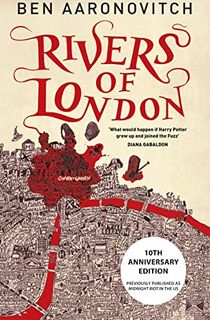
Rivers of London: 10th Anniversary Edition (Rivers of London US Book 1)
Amp Up the Creativity
But it’s more than aesthetics. Fantasy is a tool to help mystery writers get even more creative with their work. Gigi Pandian, author of the Accidental Alchemist Mystery series and Secret Staircase Mystery series, explained it best, “Everything has been done before. But telling new stories is all about telling it in a unique way with a unique voice. Incorporating fantasy elements is one way to bring in really fun elements into a story.”
For instance, Pandian’s 7 book (so far) Accidental Alchemist series brings in fun elements that take readers to new places in the genre. There’s a 300+ year old alchemist named Zoe Faust who has to move frequently so people don’t realize that she’s far older than she should be and a living gargoyle named Dorian Robert-Houdin. That alone would be a fun mix but when Faust finds a dead body on her back porch, she’s got a lot to find out…and a lot to hide.
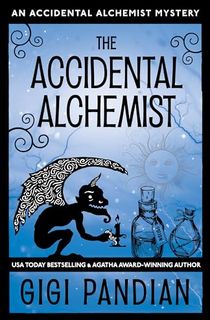
The Accidental Alchemist (An Accidental Alchemist Mystery, 1)
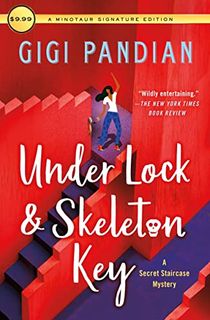
Under Lock & Skeleton Key: A Secret Staircase Mystery (Secret Staircase Mysteries Book 1)
Jennifer J. Chow, author of the soon to be released Ill-Fated Fortune that involves magical baked goods and fortune telling…fortune cookies, also aptly noted, “Murder mysteries, in themselves, are sort of fantasies—at least, they are for cozies, where amateur sleuths solve cases, perpetrators get caught, and endings deliver happiness. Fantasy would be a natural extension of that imaginative world.”
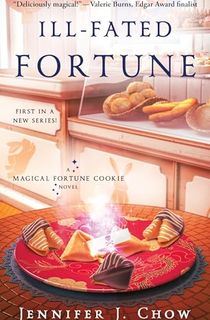
Ill-Fated Fortune: A Magical Fortune Cookie Novel
While there are many mysteries that take place in bookstores and libraries (good ones too), fantasy can take these subgenres of mysteries and take them to new heights, like Genevieve Cogman’s The Invisible Library series, which includes entire worlds and librarians who try to manage them.

The Invisible Library
Hiding the Clues
Not only does fantasy allow writers to take their mysteries into new and unexpected directions, but McDonnell also finds fantasy, like humor, can help with misdirection. He explained, “The great thing with fantasy and comedy is that it's a brilliant way of disguising something. If you can slip something in funny, people think that's the reason that the reason that sentence is there is because there was a funny thing about a window. And then later on, it turns out that's actually a really key fact.” The similar is true for fantasy, he noted.
Writers can use fantastical elements that make the reader feel the world is fleshed out without realizing that the fact was actually a really big clue. Caimh McDonnell’s series The Stranger Times takes that to heart (both with humor and fantasy) since it is about a tabloid paper that writes the stories about aliens and ghosts…only to realize that there are supernatural things in the world and murders that have to be solved. This four book series (so far) really does a great job hiding the clues behind fantasy/comedic moments.
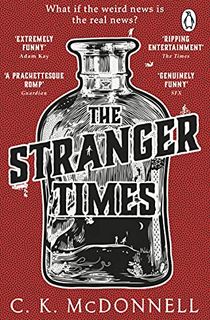
The Stranger Times: (The Stranger Times 1)
Learning the Rules
Another great element of fantasy mysteries is that they can help amp up the tension. McDonnell explained, “It's easy to sort of keep the suspense going for readers because you also don't fundamentally still really understand how this world works.” You, along with the main character, are figuring things out at the same time. We find that with The Stranger Times’s Hannah Willis who joins the paper and has to get accustomed to the banana world in the newsroom and the newly uncovered magical world. Similarly, Peter Grant in the Rivers of London series because he has to figure out how to solve crimes, be a magician, and figure out how magic works.
But it’s also important that the magic does not overwhelm the story. It won’t be much fun if the detective has the ability to mind-read or see the past to figure out the murderer just like that. Pandian explained, it’s “all about balance.” For instance, in Stuart Turton’s The Seven and Half Deaths of Evelyn Hardcastle, the main character has eight days and eight different points of view to figure out the murderer. It works because there are a lot of rules to limit how much the main character can learn with any given character.
Pandian concluded that if you are a reader who won’t try fantasy, you might be “casting too wide a net with what they're rejecting…things that are firmly grounded in mystery you might have more fun with than you think.”
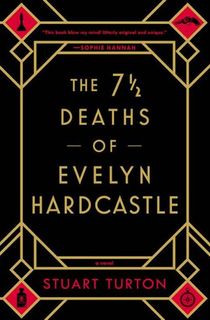
The 7 1/2 Deaths of Evelyn Hardcastle
If you're looking for more fantasy mystery recommendations, check out a more exhaustive list of our favorites here.
Featured photo: Leo_Visions / Unsplash
.png?w=3840)






